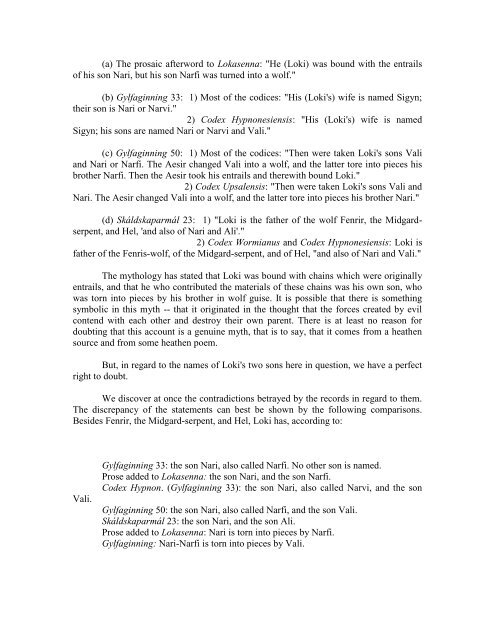Chapters 44-95 - Germanic Mythology
Chapters 44-95 - Germanic Mythology
Chapters 44-95 - Germanic Mythology
You also want an ePaper? Increase the reach of your titles
YUMPU automatically turns print PDFs into web optimized ePapers that Google loves.
(a) The prosaic afterword to Lokasenna: "He (Loki) was bound with the entrails<br />
of his son Nari, but his son Narfi was turned into a wolf."<br />
(b) Gylfaginning 33: 1) Most of the codices: "His (Loki's) wife is named Sigyn;<br />
their son is Nari or Narvi."<br />
2) Codex Hypnonesiensis: "His (Loki's) wife is named<br />
Sigyn; his sons are named Nari or Narvi and Vali."<br />
(c) Gylfaginning 50: 1) Most of the codices: "Then were taken Loki's sons Vali<br />
and Nari or Narfi. The Aesir changed Vali into a wolf, and the latter tore into pieces his<br />
brother Narfi. Then the Aesir took his entrails and therewith bound Loki."<br />
2) Codex Upsalensis: "Then were taken Loki's sons Vali and<br />
Nari. The Aesir changed Vali into a wolf, and the latter tore into pieces his brother Nari."<br />
(d) Skáldskaparmál 23: 1) "Loki is the father of the wolf Fenrir, the Midgardserpent,<br />
and Hel, 'and also of Nari and Ali'."<br />
2) Codex Wormianus and Codex Hypnonesiensis: Loki is<br />
father of the Fenris-wolf, of the Midgard-serpent, and of Hel, "and also of Nari and Vali."<br />
The mythology has stated that Loki was bound with chains which were originally<br />
entrails, and that he who contributed the materials of these chains was his own son, who<br />
was torn into pieces by his brother in wolf guise. It is possible that there is something<br />
symbolic in this myth -- that it originated in the thought that the forces created by evil<br />
contend with each other and destroy their own parent. There is at least no reason for<br />
doubting that this account is a genuine myth, that is to say, that it comes from a heathen<br />
source and from some heathen poem.<br />
But, in regard to the names of Loki's two sons here in question, we have a perfect<br />
right to doubt.<br />
We discover at once the contradictions betrayed by the records in regard to them.<br />
The discrepancy of the statements can best be shown by the following comparisons.<br />
Besides Fenrir, the Midgard-serpent, and Hel, Loki has, according to:<br />
Vali.<br />
Gylfaginning 33: the son Nari, also called Narfi. No other son is named.<br />
Prose added to Lokasenna: the son Nari, and the son Narfi.<br />
Codex Hypnon. (Gylfaginning 33): the son Nari, also called Narvi, and the son<br />
Gylfaginning 50: the son Nari, also called Narfi, and the son Vali.<br />
Skáldskaparmál 23: the son Nari, and the son Ali.<br />
Prose added to Lokasenna: Nari is torn into pieces by Narfi.<br />
Gylfaginning: Nari-Narfi is torn into pieces by Vali.
















